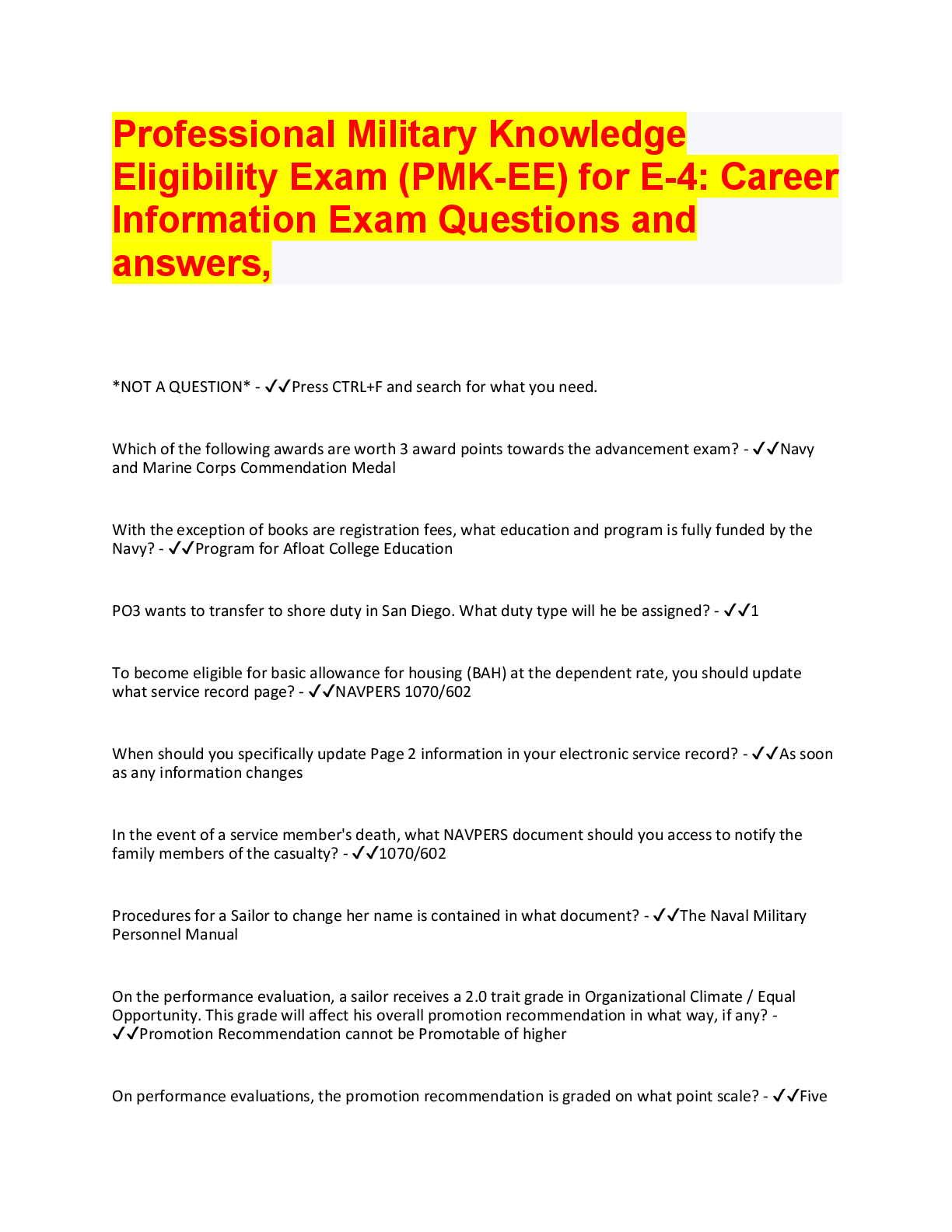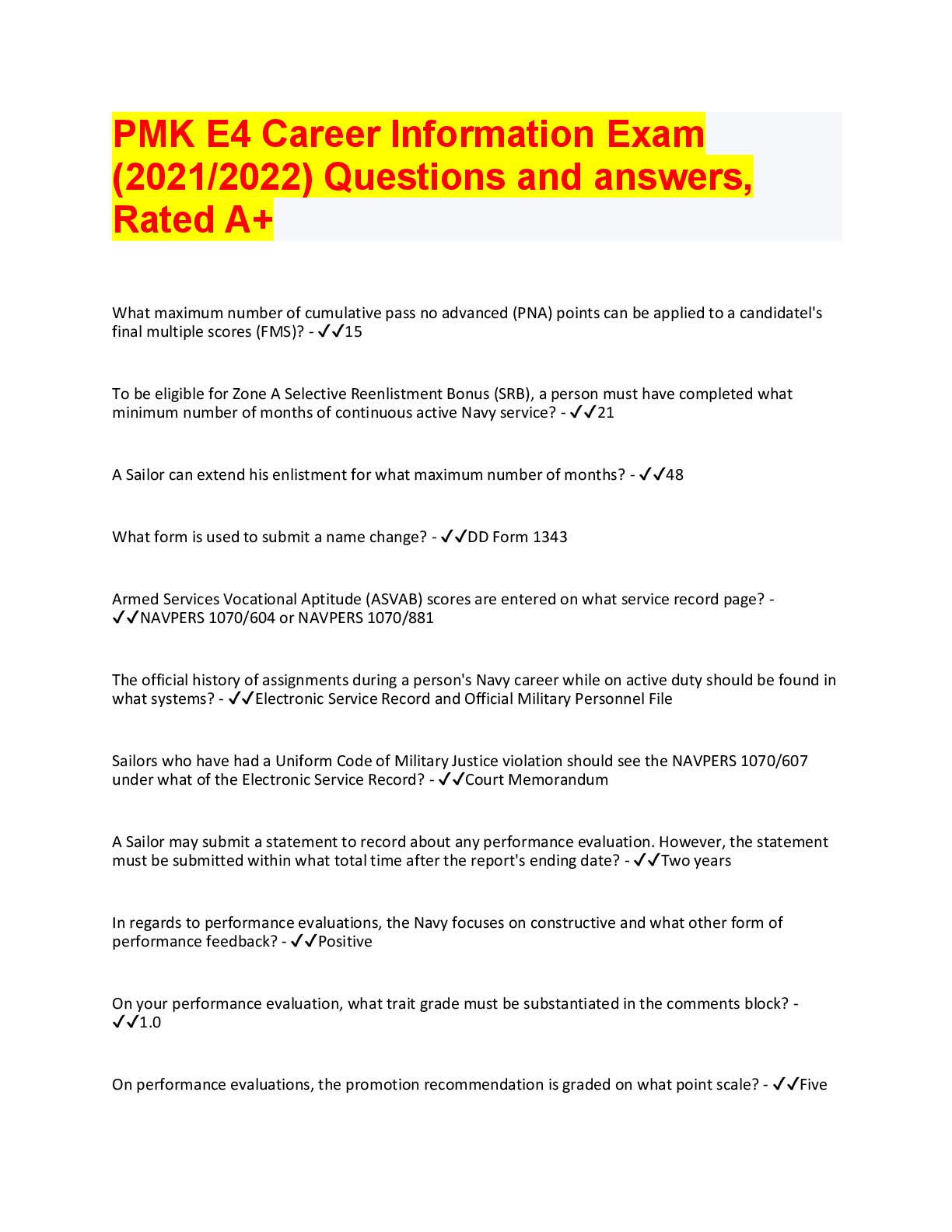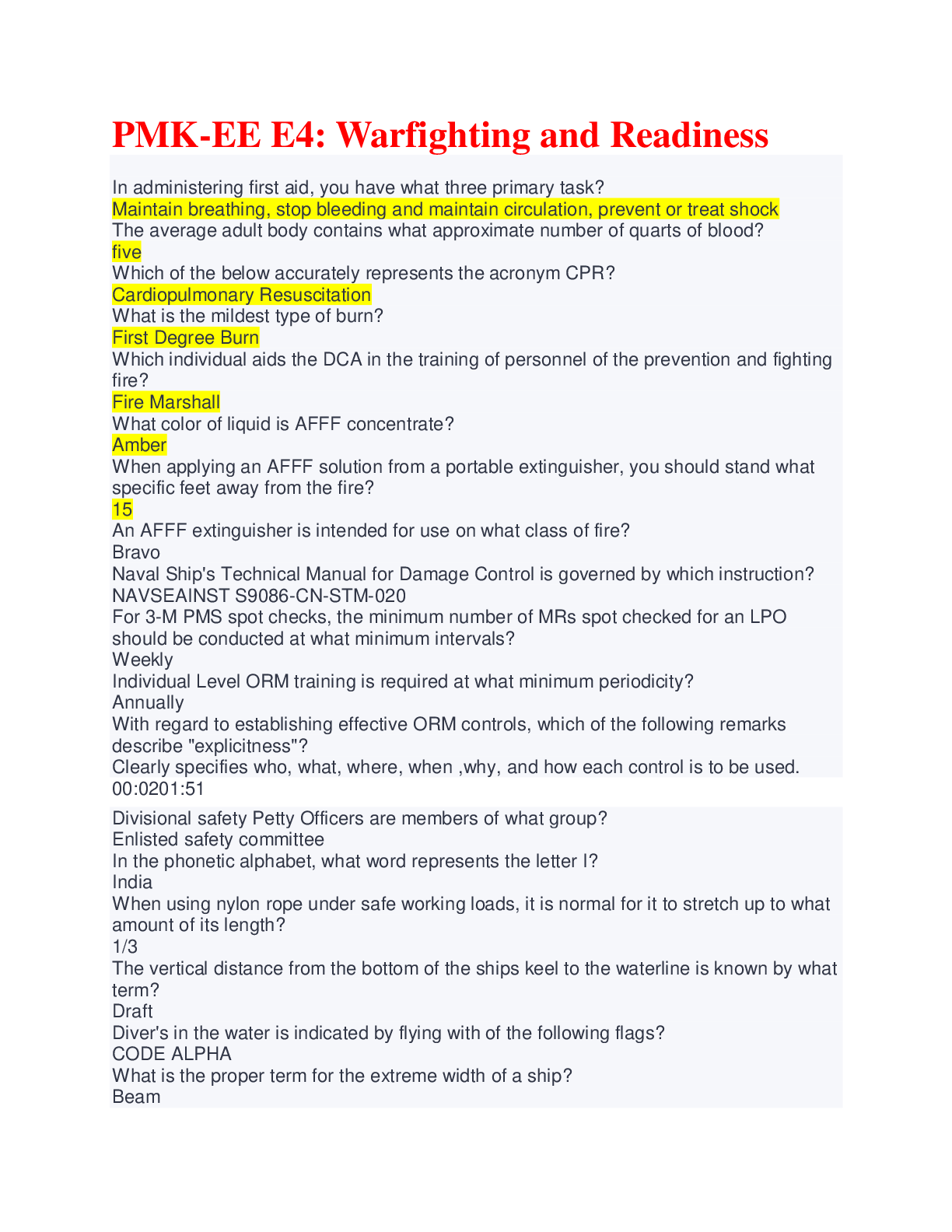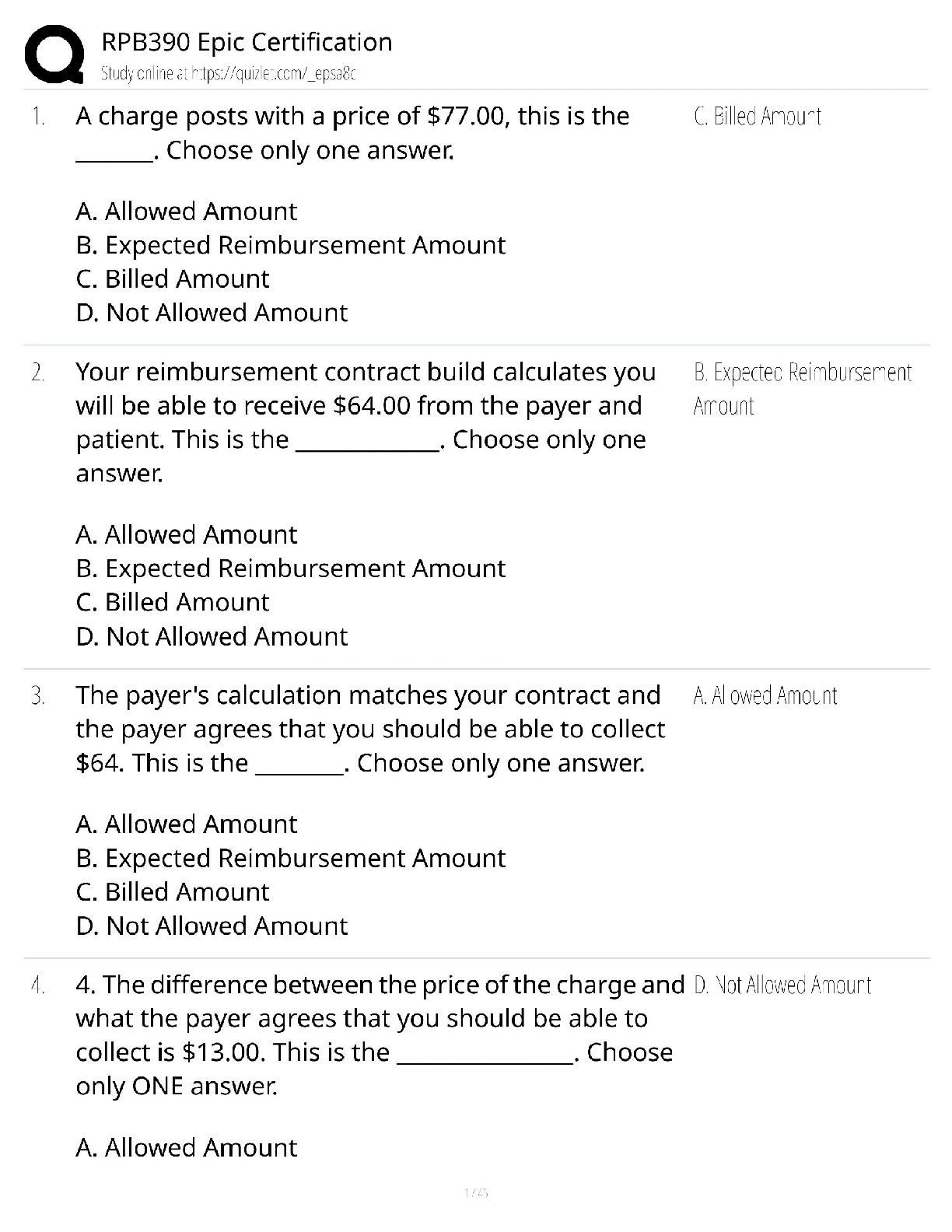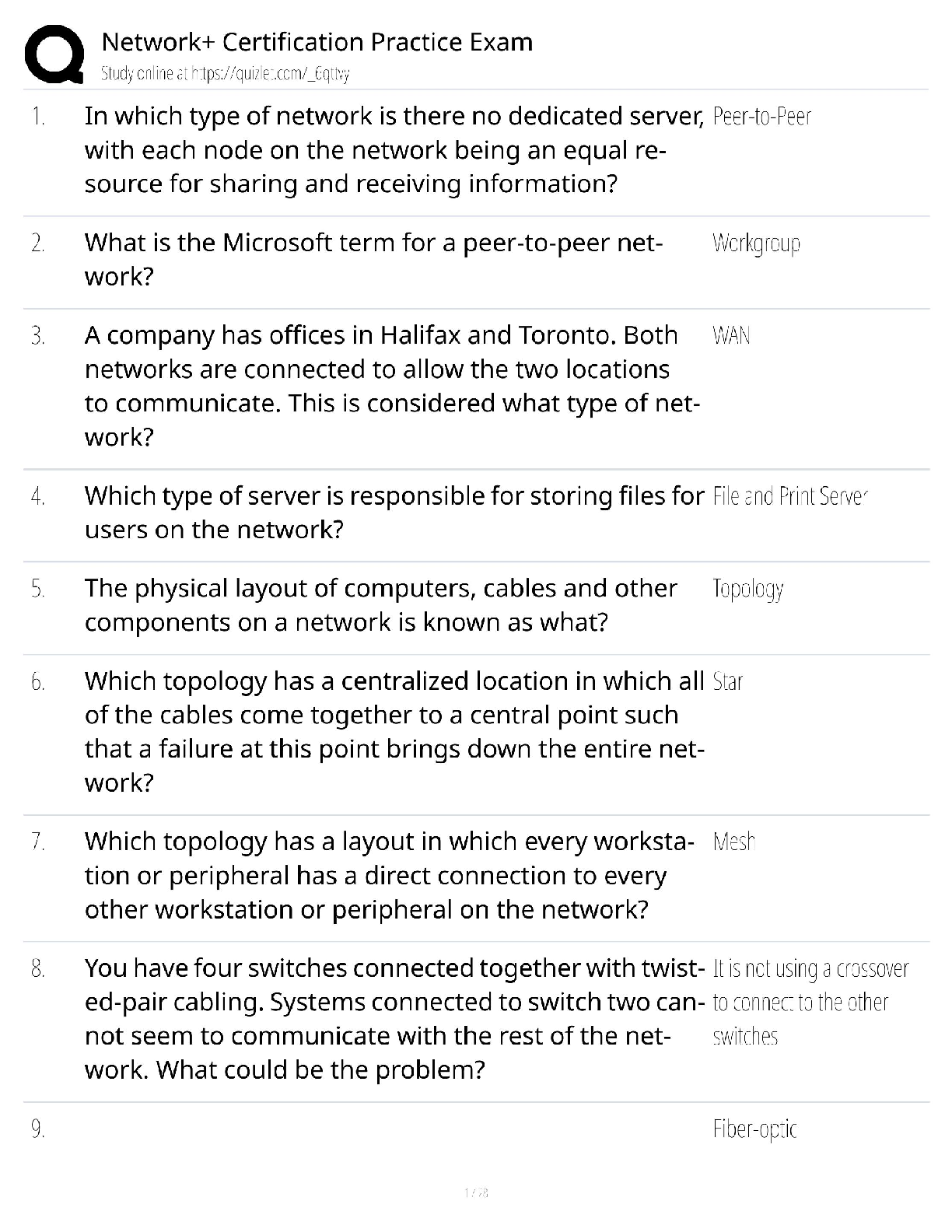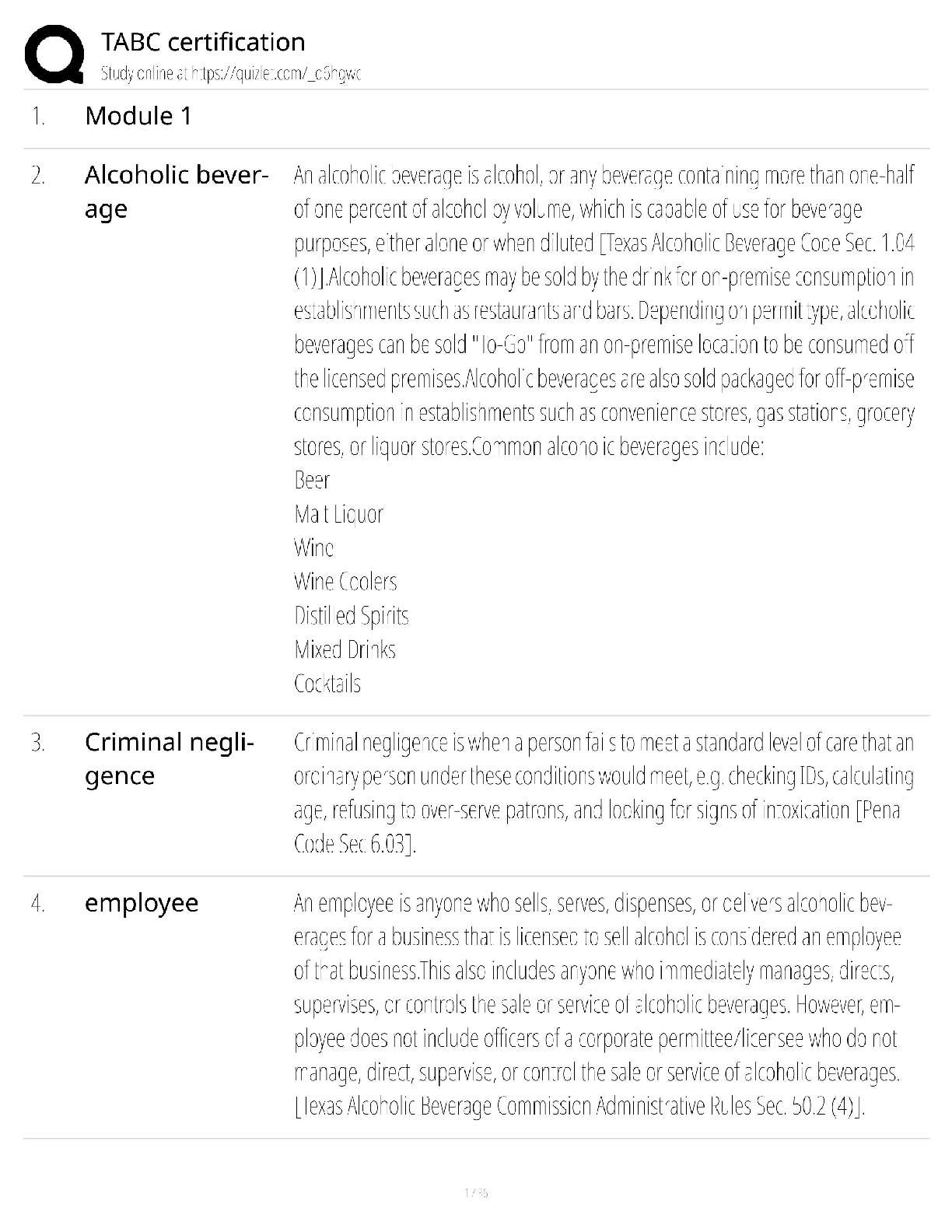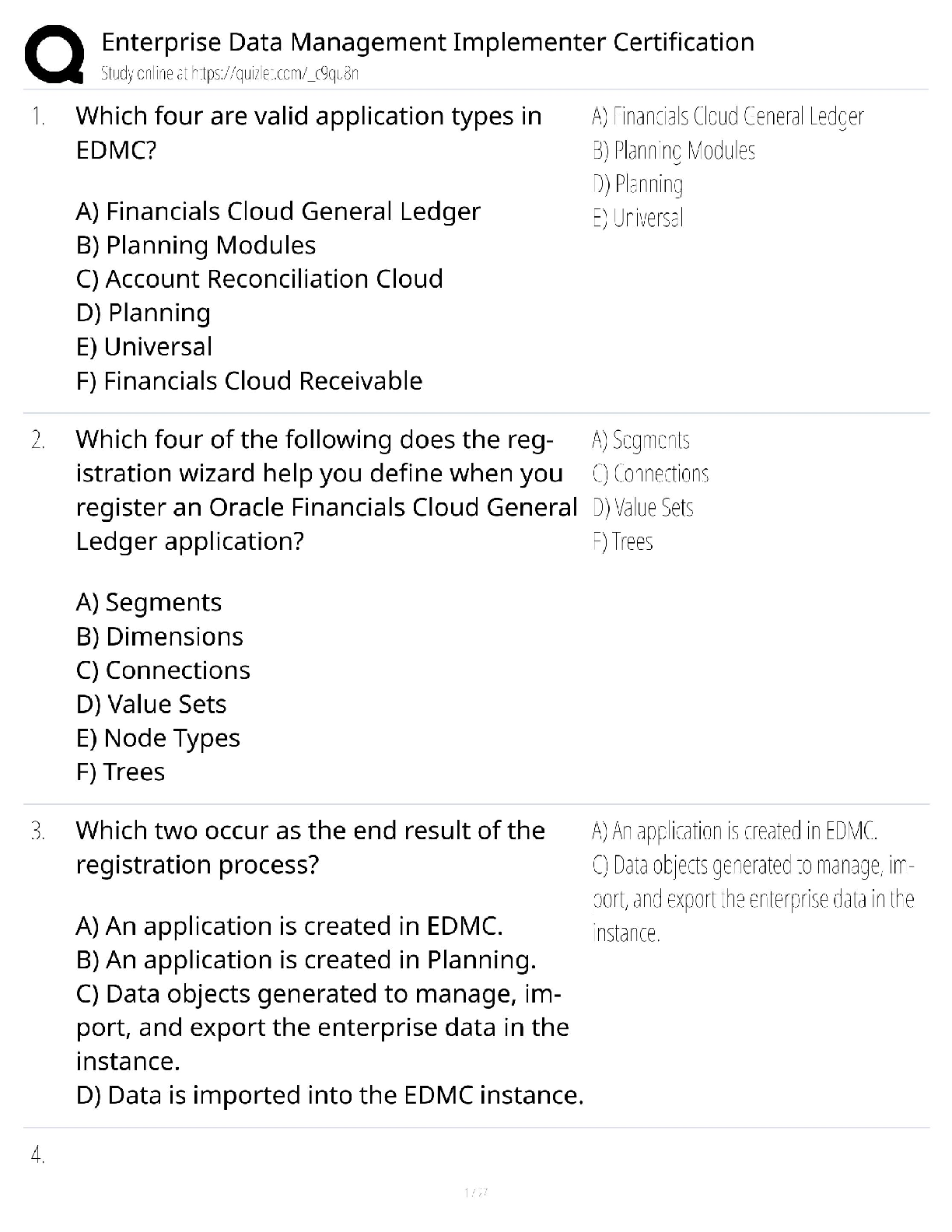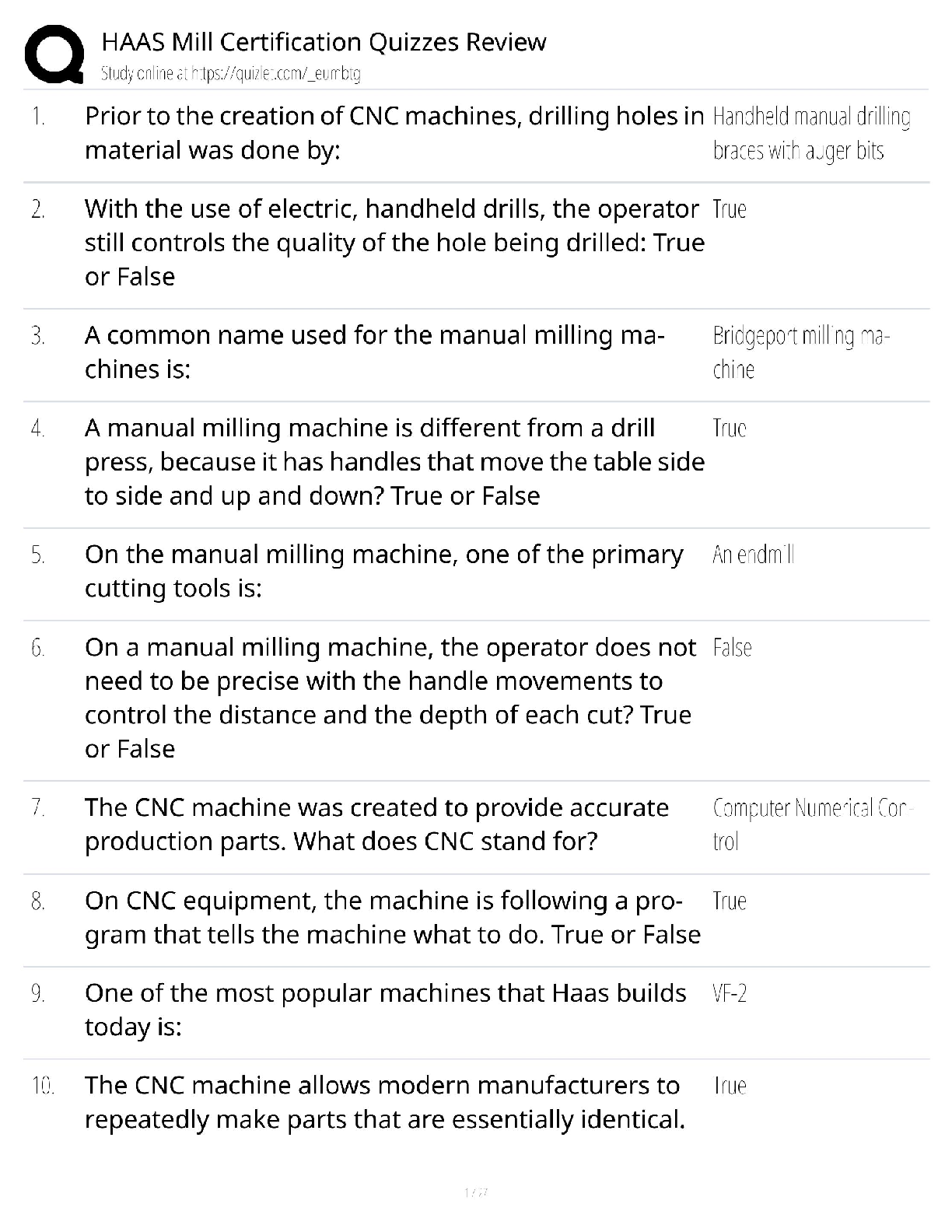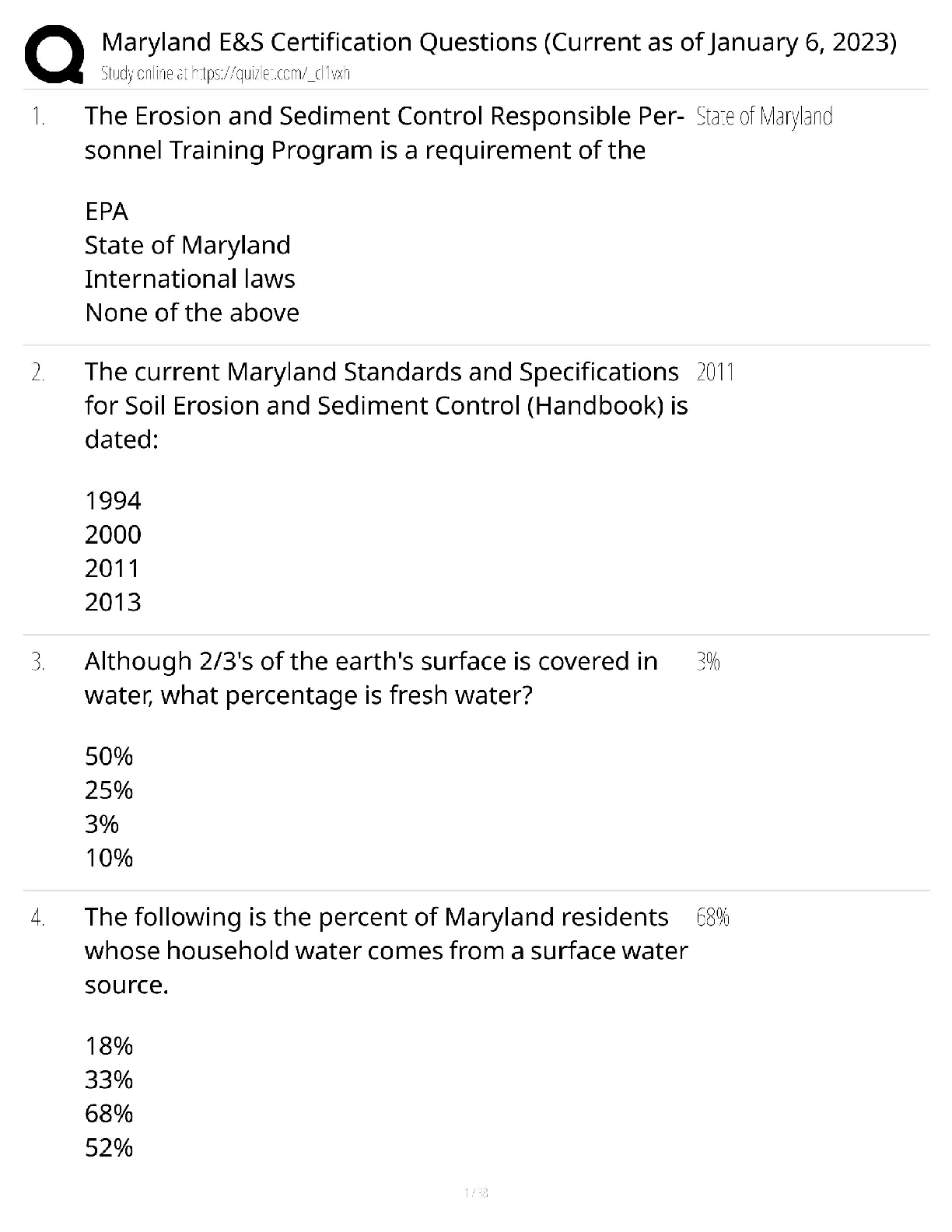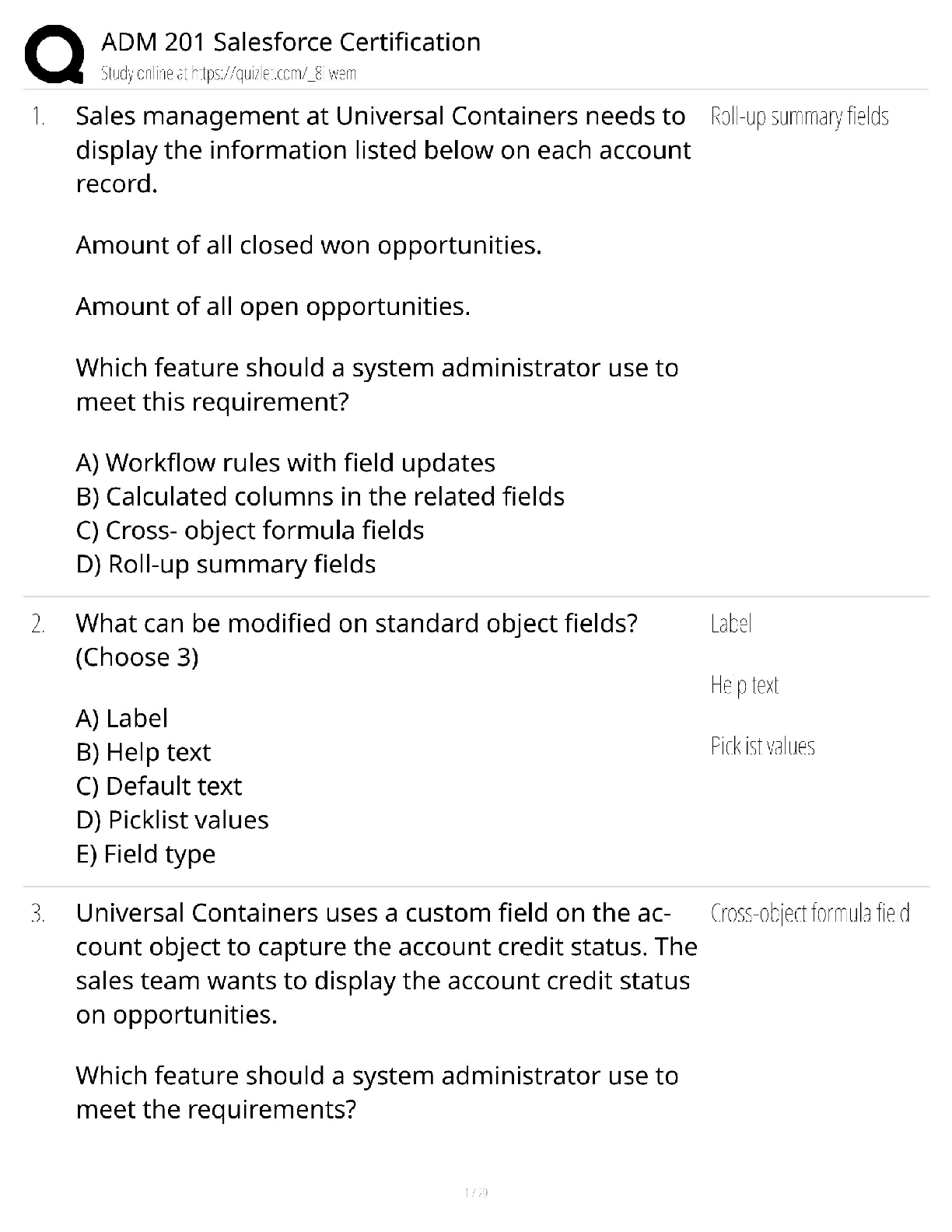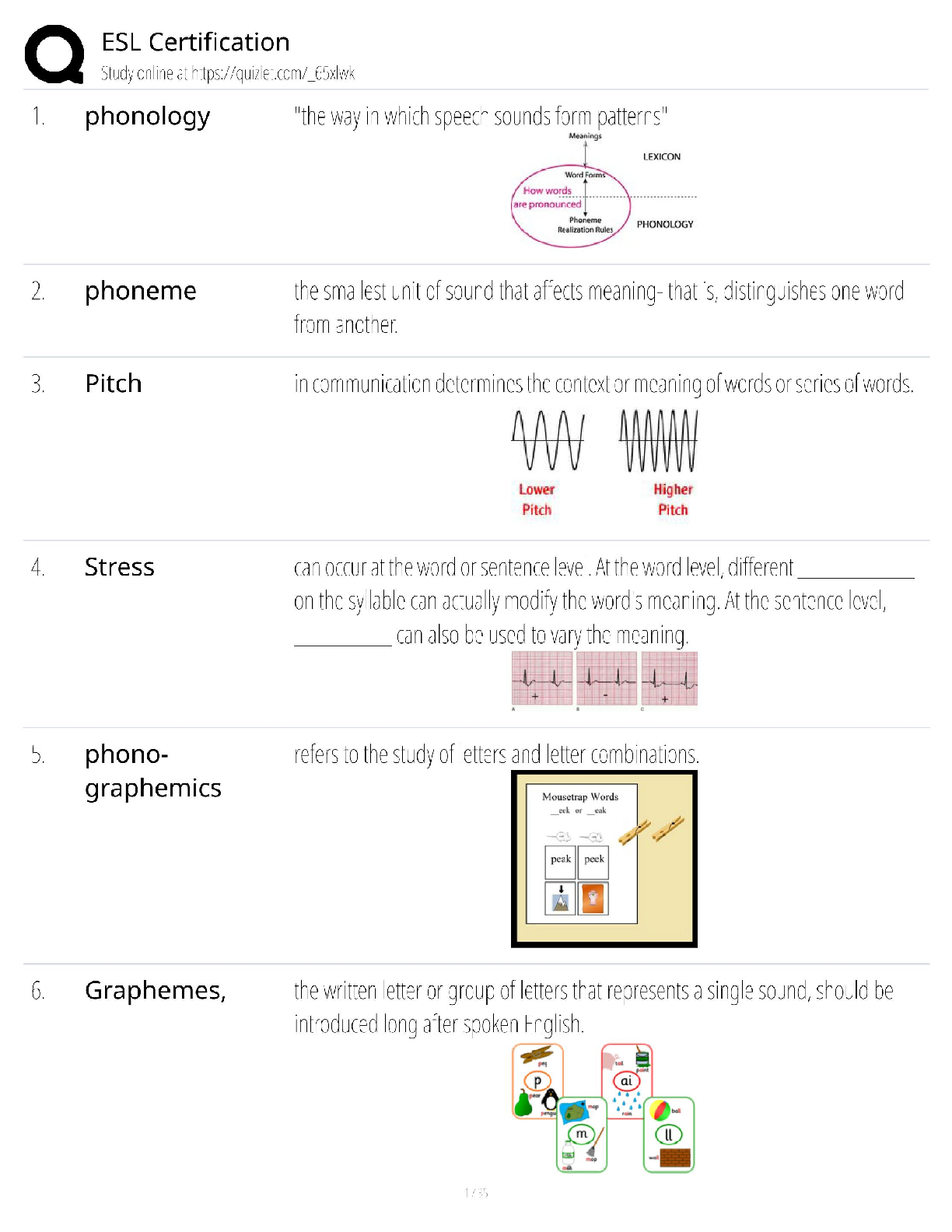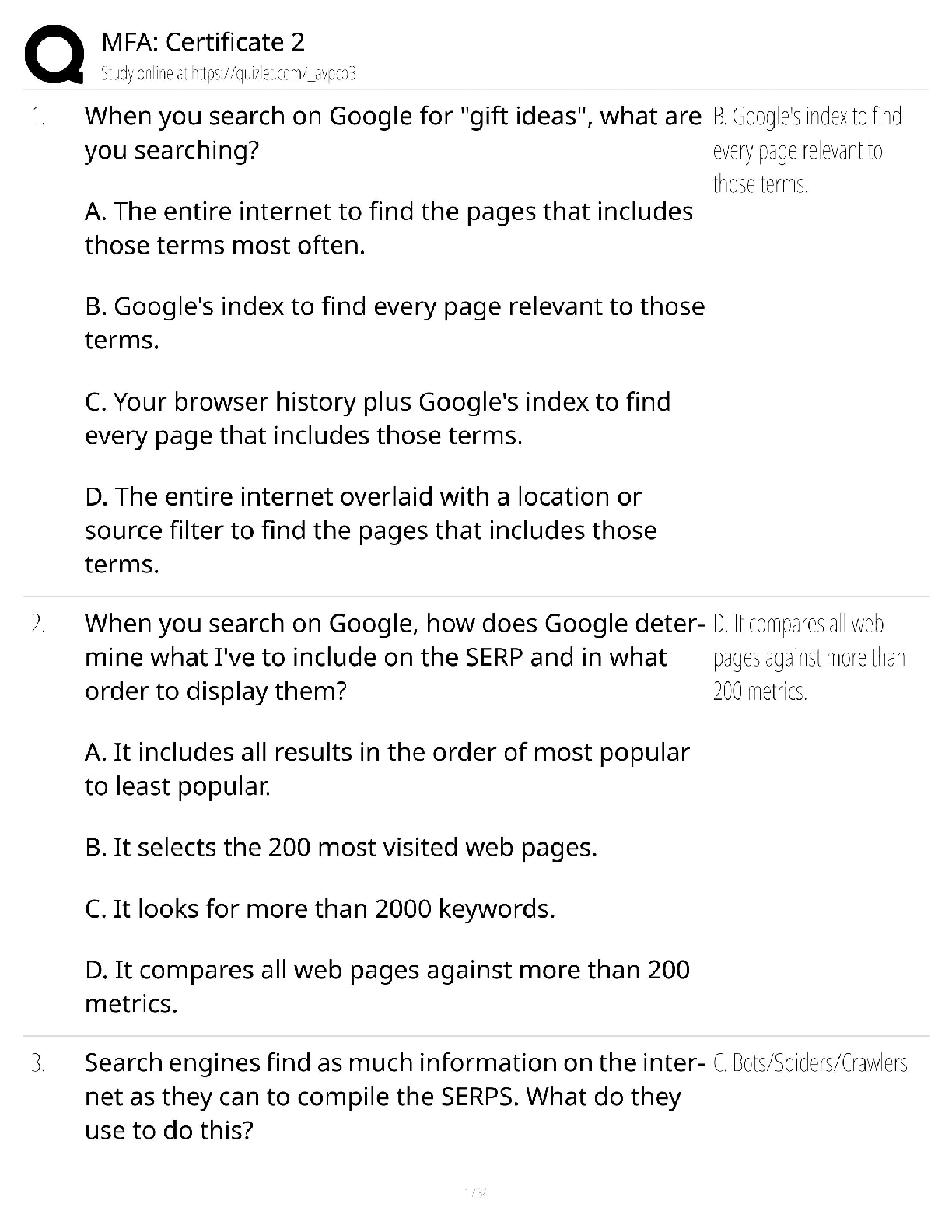*NURSING > QUESTIONS & ANSWERS > AHIP 2021, Questions and answers. 100% Accurate. Graded A+ (All)
AHIP 2021, Questions and answers. 100% Accurate. Graded A+
Document Content and Description Below
AHIP 2021, Questions and answers. 100% Accurate. Graded A+ Mr. Xi will soon turn age 65 and has come to you for advice as to what services are provided under Original Medicare. What should you te ... ll Mr. Xi that best describes the health coverage provided to Medicare beneficiaries? a. Medicare Part B generally provides prescription drug coverage. b. Beneficiaries under Original Medicare have no cost-sharing for most preventive services which include immunizations such as annual flu shots. c. Medicare Part A generally covers medically necessary physician and other health care professional services. d. Benefits covered by Medicare Parts A and B include routine dental care, hearing aids, and routine eye care. - ✔✔b. Beneficiaries under Original Medicare have no cost-sharing for most preventive services which include immunizations such as annual flu shots. (Beneficiaries enrolled in both Original Medicare (Parts A and B) have no cost-sharing for most preventive services. These services include immunizations such as annual flu shots.) Mr. Singh would like drug coverage but does not want to be enrolled in a Medicare Advantage plan. What should you tell him? a. Mr. Singh must leave Original Medicare to receive drug coverage. b. Part D prescription drug coverage can only be obtained by enrollment into a Medicare Advantage plan that also covers Part A and Part B services. c. Mr. Singh will have to enroll in Medicaid if he wishes to obtain prescription drug coverage through some means other than a Medicare Advantage plan. d. Mr. Singh can enroll in a stand-alone prescription drug plan and continue to be covered for Part A and Part B services through Original Fee-for-Service Medicare. - ✔✔d. Mr. Singh can enroll in a stand-alone prescription drug plan and continue to be covered for Part A and Part B services through Original Fee-for-Service Medicare. (Prescription drug coverage is available to those who enroll in a stand-alone Part D prescription drug plan and continue coverage under Original Medicare Part A and Part B.) Mrs. Paterson is concerned about the deductibles and co-payments associated with Original Medicare. What can you tell her about Medigap as an option to address this concern? a. Medigap plans help beneficiaries cover coinsurance, co-payments, and/or deductibles for medically necessary services. b. Medigap plans are not sold by private companies and are a government insurance product. c. All costs not covered by Medicare are covered by some Medigap plans. d. If Mrs. Paterson applies during the Medigap open enrollment period, she will have to undergo a medical review to determine if she has a pre-existing condition that would increase the premium for a Medigap policy. - ✔✔a. Medigap plans help beneficiaries cover coinsurance, co-payments, and/or deductibles for medically necessary services. (Medigap plans help beneficiaries cover coinsurance, co-payments, and/or deductibles when Original Medicare determines that a benefit is medically necessary.) Mr. Diaz continued working with his company and was insured under his employer's group plan until he reached age 68. He has heard that there is a premium penalty for those who did not sign up for Part B when first eligible and wants to know how much he will have to pay. What should you tell him? a. The penalty will be a permanent 10% increase in his Part B premium for every 12-month period that passed during which he could have enrolled and did not. b. Mr. Diaz will pay a penalty, which will be a flat amount each year, paid during the first month of coverage. c. During the first year, he is covered under Part B, his premiums will be 10% higher than they otherwise would be, after which point they will return to normal. d. Mr. Diaz will not pay any penalty because he had continuous coverage under his employer's plan. - ✔✔d. Mr. Diaz will not pay any penalty because he had continuous coverage under his employer's plan. (Individuals with coverage based on their own current employment are not subject to the late enrollment penalty.) Ms. Moore plans to retire when she turns 65 in a few months. She is in excellent health and will have considerable income when she retires. She is concerned that her income will make it impossible for her to qualify for Medicare. What could you tell her to address her concern? a. Medicare is a program for people age 65 or older and those under age 65 with certain disabilities, end-stage renal disease, and Lou Gehrig's disease so she will be eligible for Medicare. b. Eligibility for Medicare is based on whether or not a person has ever been employed by the federal government. If she or her husband were ever employed by the federal government, she can enroll in Medicare. c. Medicare is a program for people who have incomes and assets below specific limits, so you will have to find out her exact financial situation before telling her whether she can obtain Medicare coverage. d. Medicare is a program for people of all ages with specific mental health disabilities. Since she is in excellent health, she would not qualify, but should instead look into her state's Medicaid program if she wants further coverage. - ✔✔a. Medicare is a program for people age 65 or older and those under age 65 with certain disabilities, end-stage renal disease, and Lou Gehrig's disease so she will be eligible for Medicare. (Individuals that meet these criteria may be eligible to participate in Medicare. It is not based on income.) Madeline Martinez was widowed several years ago. Her husband worked for many years and contributed into the Medicare system. He also left a substantial estate which provides Madeline with an annual income of approximately $130,000. Madeline, who has only worked part-time for the last three years, will soon turn age 65 and hopes to enroll in Original Medicare. She comes to you for advice. What should you tell her? a. You should tell Madeline that she will be able to enroll in Medicare Part A without paying monthly premiums due to her husband's long work record and participation in the Medicare system. You should also tell Madeline that she will pay Part B premiums at the highest rate because her income over the last several years has exceeded $100,000. b. You should tell Madeline that she will need to pay premiums for Part A because of her short work history. You should also tell Madeline that she will pay Part B premiums at the highest rate because her income over the last several years has exceeded $100,000. c. You should tell Madeline that she will be able to enroll in Medicare Part A without paying monthly premiums due to her husband's long work record and participation in the Medicare system. You should also tell Madeline that she will pay Part B premiums at more than the standard lowest rate but less than the highest rate due her substantial income. d. You should tell Madeline that she will be able to enroll in both Medicare Part A and Part B without paying monthly premiums due to her husband's long work record and participation in the Medicare system. - ✔✔c. You should tell Madeline that she will be able to enroll in Medicare Part A without paying monthly premiums due to her husband's long work record and participation in the Medicare system. You should also tell Madeline that she will pay Part B premiums at more than the standard lowest rate but less than the highest rate due her substantial income. (Madeline will be able to enroll in premium-free Part A due to her husband's work record. She will pay a premium for Part B coverage based on her income level (her income-related monthly adjustment amount [IRMMA]). An income level of $100,00 would mean Mrs. Martinez would pay a premium more than the standard (lowest) amount but not at the highest level which looks at incomes above $500,000 for those filing individual income tax returns.) Mr. Davis is 52 years old and has recently been diagnosed with end-stage renal disease (ESRD) and will soon begin dialysis. He is wondering if he can obtain coverage under Medicare. What should you tell him? a. He may not sign-up for Medicare until he reaches age 62, the date he first becomes eligible for Social Security benefits. b. He may sign-up for Medicare at any time and coverage usually begins immediately. c. He may sign-up for Medicare at any time however coverage usually begins on the fourth month after dialysis treatments start. d. He may sign-up for Medicare at any time however coverage usually begins on the sixth month after dialysis treatments start. - ✔✔c. He may sign-up for Medicare at any time however coverage usually begins on the fourth month after dialysis treatments start. (Medicare coverage for individuals with ESRD typically begins on the fourth month after dialysis treatments start.) Mr. Wu is eligible for Medicare. He has limited financial resources but failed to qualify for the Part D low-income subsidy. Where might he turn for help with his prescription drug costs? a. Mr. Wu may still qualify for help in paying Part D costs through his State Pharmaceutical Assistance Program. b. Mr. Wu may still qualify for help in paying for Part D costs through the Federal Pharmaceutical Assistance Program. c. Mr. Wu may still qualify for help in paying for Part D costs through the local Office of the Aging. d. Mr. Wu has no alternative but to liquidate his remaining assets and apply for coverage through his state's Medicaid program. - ✔✔a. Mr. Wu may still qualify for help in paying Part D costs through his State Pharmaceutical Assistance Program. (A State Pharmaceutical Assistance Program may be able to provide assistance with prescription drug costs for those who are of limited means but do not qualify for the Part D low-income subsidy.) Mr. Moy's wife has a Medicare Advantage plan, but he wants to understand what coverage Medicare Supplemental Insurance provides since his health care needs are different from his wife's needs. What could you tell Mr. Moy? a. Medicare Supplemental Insurance would cover his long-term care services. b. Medicare Supplemental Insurance would cover all of his IRS approved health care expenditures not covered under Original Fee-for-Service (FFS) Medicare. c. Medicare Supplemental Insurance would help cover his Part A and Part B cost sharing in Original Fee-for-Service (FFS) Medicare as well as possibly some services that Medicare does not cover. d. Medicare Supplemental Insurance would cover his dental, vision and hearing services only. - ✔✔c. Medicare Supplemental Insurance would help cover his Part A and Part B cost sharing in Original Fee-for-Service (FFS) Medicare as well as possibly some services that Medicare does not cover. (Medicare Supplement Insurance (Medigap) helps to cover Part A and Part B cost-sharing in Original Medicare as well as possibly offering some services such as medical care when a beneficiary travels outside the United States.) Mr. Schmidt would like to plan for retirement and has asked you what is covered under Original Fee-for-Service (FFS) Medicare? What could you tell him? a. Part D, which covers prescription drug services, is covered under Original Medicare. b. Part A, which covers long term custodial care services, is covered under Original Medicare. c. Part C, which always covers dental and vision services, is covered under Original Medicare. d. Part A, which covers hospital, skilled nursing facility, hospice, and home health services and Part B, which covers professional services such as those provided by a doctor are covered under Original Medicare. - ✔✔d. Part A, which covers hospital, skilled nursing facility, hospice, and home health services and Part B, which covers professional services such as those provided by a doctor are covered under Original Medicare. (Original Medicare consists of Part A and Part B.) Mrs. Shields is covered by Original Medicare. She sustained a hip fracture and is being successfully treated for that condition. However, she and her physicians feel that after her lengthy hospital stay she will need a month or two of nursing and rehabilitative care. What should you tell them about Original Medicare's coverage of care in a skilled nursing facility? a. Once she has expended her liquid assets, Medicare will cover 80% of Mrs. Shields long-term care costs. b. Medicare will cover Mrs. Shield's skilled nursing services provided during the first 20 days of her stay, after which she would have a copay until she has been in the facility for 100 days. c. Medicare will cover an unlimited number of days in a skilled-nursing facility, as long as a physician certifies that such care is needed. d. Mrs. Shields will have to apply for Medicaid to have her skilled nursing services covered because Medicare does not provide such a benefit. - ✔✔b. Medicare will cover Mrs. Shield's skilled nursing services provided during the first 20 days of her stay, after which she would have a copay until she has been in the facility for 100 days. (Mrs. Shields has experienced a long hospital stay, over the 3-day time period to qualify for skilled nursing and rehabilitative care benefits under Medicare.) Mrs. Geisler's neighbor told her she should look at her Part D options during the annual Medicare enrollment period because features of Part D might have changed. Mrs. Geisler can't remember what Part D is so she called you to ask what her neighbor was talking about. What could you tell her? a. Part D covers physician and non-physician practitioner services and the deductible has not changed this year, but the physician charges may go up. b. Part D covers hospital and home health services and the cost sharing has changed this year. c. Part D covers prescription drugs and she should look at her premiums, formulary, and cost-sharing among other factors to see if they have changed. d. Part D covers long-term care services and she shouldn't worry because there has been no change in coverage. - ✔✔c. Part D covers prescription drugs and she should look at her premiums, formulary, and cost-sharing among other factors to see if they have changed. (Part D provides prescription drug coverage. Premiums, plan formularies, and cost-sharing, among other factors, may change from one plan year to another.) Mrs. Chen will be 65 soon, has been a citizen for twelve years, has been employed full time, and paid taxes during that entire period. She is concerned that she will not qualify for coverage under part A because she was not born in the United States. What should you tell her? a. All individuals who are citizens and age 65 or over will be covered under Part A. b. Most individuals who are citizens and age 65 or over and wish to be covered under Part A must enroll in a Medicare Advantage Plan. c. Most individuals who are citizens and age 65 or over are covered under Part A by virtue of having paid Medicare taxes while working, though some may be covered as a result of paying monthly premiums. d. Most individuals who are citizens and age 65 or over and are covered under Part A must pay a monthly premium for that coverage. - ✔✔c. Most individuals who are citizens and age 65 or over are covered under Part A by virtue of having paid Medicare taxes while working, though some may be covered as a result of paying monthly premiums. (Most individuals who are citizens and age 65 or older may qualify for coverage either because they pay a monthly premium or because they paid Medicare taxes while working for a specific duration.) What impact, if any, will recent regulatory changes have upon Medigap plans? a. The Part A deductible is no longer covered under Medigap plans for all enrollees starting January 1, 2020. b. The Part B deductible will no longer be covered for individuals newly eligible for Medicare starting January 1, 2020. c. The Part B deductible will be covered for some newly eligible individuals depending on their financial status. d. The Part A deductible will no longer be covered for individuals newly eligible for Medicare starting January 1, 2020. - ✔✔b. The Part B deductible will no longer be covered for individuals newly eligible for Medicare starting January 1, 2020. (Starting January 1, 2020, Medigap plans sold to individuals who are newly eligible to Medicare will not be allowed to cover the Part B deductible. If an individual already had one of the plans before January 1, 2020, they will be able to keep their plan. If an individual was eligible for Medicare before January 1, 2020, but not yet enrolled, his or she may be able to purchase one of these plans.) Mr. Bauer is 49 years old, but eighteen months ago he was declared disabled by the Social Security Administration and has been receiving disability payments. He is wondering whether he can obtain coverage under Medicare. What should you tell him? a. He became eligible for Medicare when his disability eligibility determination was first made. b. After receiving such disability payments for 24 months, he will be automatically enrolled in Medicare, regardless of age. c. Individuals who become eligible for such disability payments only have to wait 12 months before they can apply for coverage under Medicare. d. Individuals receiving such disability payments from the Social Security Administration continue to receive those payments but only become eligible for Medicare upon reaching age 65. - ✔✔b. After receiving such disability payments for 24 months, he will be automatically enrolled in Medicare, regardless of age. (Individuals with disabilities who are under age 65 are automatically enrolled in Medicare Parts A and B the month after they have received Social Security or Railroad Retirement disability benefits for 24 months.) Juan Perez, who is turning age 65 next month, intends to work for several more years at Smallcap, Incorporated. Smallcap has a workforce of 15 employees and offers employer-sponsored healthcare coverage. Juan is a naturalized citizen and has contributed to the Medicare system for over 20 years. Juan asks you if he will be entitled to Medicare and if he enrolls how that will impact his employer-sponsored healthcare coverage. How would you respond? a. Juan is likely to be eligible for Medicare once he turns age 65 and if he enrolls Medicare would become the primary payor of his healthcare claims and Smallcap does not have to continue to offer him coverage comparable to those under age 65 under its employer-sponsored group health plan. b. Juan is likely to be eligible for Medicare once he turns age 65 and if he enrolls his employer-sponsored coverage would continue to be the primary payor while Medicare would be considered a secondary payor of his healthcare claims. c. Juan is likely to be eligible for Medicare once he turns age 65 and if he enrolls Medicare would become the primary payor of his healthcare claims but Smallcap must continue to offer him coverage under its employer-sponsored group health plan and would become a secondary payor. d. Juan is likely to be ineligible for Medicare since he was born outside the United States and has only contributed to the Medicare system for 20 years. - ✔✔a. Juan is likely to be eligible for Medicare once he turns age 65 and if he enrolls Medicare would become the primary payor of his healthcare claims and Smallcap does not have to continue to offer him coverage comparable to those under age 65 under its employer-sponsored group health plan. (small GHPs do not have to continue to offer their age 65 and over employees and their spouses the same benefits under the GHP as individuals under age 65. Nor do they have to offer such coverage under the same conditions as for individuals under age 65.) Mrs. Quinn recently turned 66 and decided after many years of work to begin receiving Social Security benefits. Shortly thereafter Mrs. Quinn received a letter informing her that she has been automatically enrolled in Medicare Part B. She wants to understand what this means. What should you tell Mrs. Quinn? a. Part B primarily covers physician services. She will be paying a monthly premium and, with the exception of many preventive and screening tests, generally will have 20% coinsurance for these services, in addition to an annual deductible. b. She should disenroll if she does not want to pay the monthly premiums. There is no disadvantage in doing so. c. Part B will cover her dental and vision needs. d. She will need to pay no premiums for Part B as she qualifies for premium-free coverage due to the number of quarters she has worked. - ✔✔a. Part B primarily covers physician services. She will be paying a monthly premium and, with the exception of many preventive and screening tests, generally will have 20% coinsurance for these services, in addition to an annual deductible. (Medicare Part B primarily covers physician services. Enrollees pay a monthly premium based on their income level and have 20 percent coinsurance cost-sharing with the exception of preventive benefits.) Mrs. Turner is comparing her employer's retiree insurance to Original Medicare and would like to know which of the following services Original Medicare will cover if the appropriate criteria are met? What could you tell her? a. Original Medicare covers routine long-term custodial care. b. Original Medicare covers cosmetic surgery. c. Original Medicare covers routine dental care. d. Original Medicare covers ambulance services. - ✔✔d. Original Medicare covers ambulance services. (Original Medicare does cover ambulance services.) Agent John Miller is meeting with Jerry Smith, a new prospect. Jerry is currently enrolled in Medicare Parts A and B. Jerry has also purchased a Medicare Supplement (Medigap) plan which he has had for several years. However, the plan does not provide drug benefits. How would you advise Agent John Miller to proceed? a. Tell prospect Jerry Smith that Medigap is simply a variation of a Medicare Advantage plan and the companies John represents offer more comprehensive coverage for a lower price. b. Tell prospect Jerry Smith that he should keep his Medigap plan but he should supplement his healthcare coverage by purchasing a Medicare Advantage plan that offers prescription drug coverage (MA-PD). c. Tell prospect Jerry Smith that he should drop his Medigap coverage and put those premium dollars toward the purchase of a standalone Part D prescription drug plan because he can always reactivate his Medigap policy on a guaranteed issue basis. Furthermore, because he has had Medigap Jerry will not incur a Part D late enrollment penalty. d. Tell prospect Jerry Smith that he should consider adding a standalone Part D prescription drug coverage policy to his present coverage. - ✔✔d. Tell prospect Jerry Smith that he should consider adding a standalone Part D prescription drug coverage policy to his present coverage. (Agent John Miller can help prospect Jerry select a standalone Part D prescription drug plan that complements his current Original Medicare and Medigap coverage. Alternatively, Agent Miller can suggest that Jerry drop his Medigap coverage and enroll in a MA-PD plan.) Anita Magri will turn age 65 in August 2020. Anita intends to enroll in Original Medicare Part A and Part B. She would also like to enroll in a Medicare Supplement (Medigap) plan. Anita's older neighbor Mel has told her about the Medigap Part F plan in which he is enrolled. It not only provides foreign travel emergency benefits but also covers his Medicare Part B deductible. Anita comes to you for advice. What should you tell her? a. You are sorry to disappoint Anita but a Medigap Part F plan is no longer available to those who turn age 65 after January 1,2020. Anita might instead consider other Medigap plans that offer foreign travel benefits but do not cover the Part B deductible. b. You would be happy to help Anita enroll in a Medigap plan but before she can do so, she must also enroll in a Medicare Part D prescription drug plan. c. You are sorry to disappoint Anita but Medigap plans are no longer available to those who turn age 65 after January 1, 2020. Anita should instead consider a Medicare Advantage plan. d. You would be happy to help Anita enroll in a Medigap Part F plan will provide foreign travel benefits as a well as cover her Part B deductible. - ✔✔a. You are sorry to disappoint Anita but a Medigap Part F plan is no longer available to those who turn age 65 after January 1,2020. Anita might instead consider other Medigap plans that offer foreign travel benefits but do not cover the Part B deductible. (Individuals who attain age 65 on or after January 1, 2020 cannot purchase a Medigap plan that pays the Part B deductible. Generally, these are plans C, F, or high deductible F. Anita can still purchase a Medigap plan that provides foreign travel emergency benefits such as plan G.) Mrs. Davenport enrolled in the ABC Medicare Advantage (MA) plan several years ago. In mid-February of 2021, her doctor confirms a diagnosis of end-stage renal disease (ESRD). What options will Mrs. Davenport have regarding her MA plan during the next open enrollment season? a. She must immediately drop her ABC MA plan and enroll in Original Medicare. b. She may remain in her ABC MA plan, enroll in another MA plan in her service area, or enroll in a Special Needs Plan (SNP) for individuals suffering from ESRD if one is available in her area. c. She must immediately drop her ABC MA plan and enroll in a Special Needs Plan (SNP) for individuals suffering from ESRD if one is available in her area. d. She must remain enrolled in her ABC MA plan unless the plan terminates. - ✔✔b. She may remain in her ABC MA plan, enroll in another MA plan in her service area, or enroll in a Special Needs Plan (SNP) for individuals suffering from ESRD if one is available in her area. (Mrs. Davenport has three clear choices: (1) remain in the ABC MA plan, (2) enroll in another MA plan in her service area, or (3) enroll in a Special Needs Plan (SPN) for persons suffering from ESRD if one is available in her area.) Mrs. Radford asks whether there are any special eligibility requirements for Medicare Advantage. What should you tell her? a. Mrs. Radford can enroll in any Medicare Advantage plan that operates within the United States. b. Mrs. Radford must apply to the Medicare Advantage plan, which will include a medical review, prior to being accepted and enrolled. c. Mrs. Radford must be entitled to Part A and enrolled in Part B to enroll in Medicare Advantage. d. Mrs. Radford must be enrolled in both Medigap and Part A to enroll in a Medicare Advantage plan. - ✔✔c. Mrs. Radford must be entitled to Part A and enrolled in Part B to enroll in Medicare Advantage. (To be eligible to enroll in Medicare Advantage, an individual must be entitled (not enrolled) to Part A and enrolled in Part B.) Mrs. Burton is a retiree with substantial income. She is enrolled in an MA-PD plan and was disappointed with the service she received from her primary care physician because she was told she would have to wait five weeks to get an appointment when she was feeling ill. She called you to ask what she could do so she would not have to put up with such poor access to care. What could you tell her? a. She should not expect to get in to see her doctor any more quickly since she is a Medicare patient. b. She must write to the plan and wait for a response and then, if she is still dissatisfied, she could file an appeal with her state Medicaid office requesting transfer to one of its managed care plans. c. She should call the doctor's office to complain since the plan cannot do anything about the doctor's schedule. d. She could file a grievance with her plan to complain about the lack of timeliness in getting an appointment. - ✔✔d. She could file a grievance with her plan to complain about the lack of timeliness in getting an appointment. (Enrollees or their representatives may file a grievance if they experience problems with their health care services, such as timeliness, appropriateness, access to, and/or setting of a provided health service, procedure, or item.) Dr. Elizabeth Brennan does not contract with the ABC PFFS plan but accepts the plan's terms and conditions for payment. Mary Rodgers sees Dr. Brennan for treatment. How much may Dr. Brennan charge? a. Dr. Brennan can charge Mary Rogers no more than the cost sharing specified in the PFFS plan's terms and condition of payment which may include balance billing up to 15%of the Medicare rate. b. Dr. Brennan can charge Mary Rodgers no more than the cost sharing specified in the PFFS plan's terms and conditions of payment which may include balance billing up to 25% of the Medicare rate. c. Dr. Brennan can charge Mary Rodgers more than the cost sharing specified in the PFFS plan's terms and conditions as long as she treats all beneficiaries the same. d. Dr. Brennan can charge the beneficiary the same cost-sharing as Original Medicare as long as she sends the claim to Medicare and not the plan. - ✔✔a. Dr. Brennan can charge Mary Rogers no more than the cost sharing specified in the PFFS plan's terms and condition of payment which may include balance billing up to 15%of the Medicare rate. (Because Dr. Brennan accepts the plan's terms and conditions for payment, she is permitted to charge this amount.) Mr. Lopez has heard that he can sign up for a product called "Medicare Advantage" but is not sure about what type of plan designs are available through this program. What should you tell him about the types of health plans that are available through the Medicare Advantage program? a. They are Medicare health plans such as HMOs, PPOs, PFFS, and MSAs. b. They are custodial long-term care plans for people with Medicare. c. They are major medical policies but are only for low-income beneficiaries with Medicare. d. They are Medigap Supplemental plans that fill in the gaps not covered by Medicare. - ✔✔a. They are Medicare health plans such as HMOs, PPOs, PFFS, and MSAs. (There are coordinated care Medicare Advantage plans that include HMOs and PPOs. There are also Private-Fee-for-Service (PFFS), Medicare Savings Account (MSA), and Special Needs Plans (SNPs).) Mrs. Chou likes a Private Fee-for-Service (PFFS) plan available in her area that does not include drug coverage. She wants to enroll in the plan and enroll in a stand-alone prescription drug plan. What should you tell her? a. She could enroll in the PFFS plan and a Medigap plan that offers drug coverage, but not in a stand-alone Medicare prescription drug plan. b. She could enroll in a PFFS plan, but not in a stand-alone drug plan. c. She could enroll in a PFFS plan and a stand-alone Medicare prescription drug plan. d. If she wants drug coverage and a PFFS plan, she [Show More]
Last updated: 3 years ago
Preview 1 out of 53 pages

Buy this document to get the full access instantly
Instant Download Access after purchase
Buy NowInstant download
We Accept:

Also available in bundle (1)
Click Below to Access Bundle(s)

AHIP Bundle,Exam Questions and answers, rated A+
Exam predictor questions and answers, 2022 update. Graded A+
By bundleHub Solution guider 3 years ago
$30
14
Reviews( 0 )
$10.00
Can't find what you want? Try our AI powered Search
Document information
Connected school, study & course
About the document
Uploaded On
Aug 31, 2022
Number of pages
53
Written in
All
Seller

Reviews Received
Additional information
This document has been written for:
Uploaded
Aug 31, 2022
Downloads
0
Views
211




